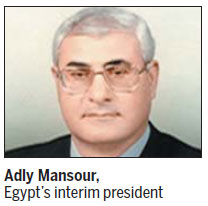Egypt's interim president sworn in amid crackdown
|
Egyptians celebrate in front of the Constitutional Court after Egypt's Chief Justice Adly Mansour was sworn in as the nation's interim president on Thursday. The Arabic reads, "Bye bye Morsi". Amr Nabil / Associated Press |

The chief justice of Egypt's Supreme Constitutional Court was sworn in on Thursday as the nation's interim president, taking over hours after the military ousted the Islamist president Mohammed Morsi.
Adly Mansour took the oath of office at the Nile-side Constitutional Court in a ceremony broadcast live on state television. According to military decree, Mansour will serve as Egypt's interim leader until a new president is elected. A date for that vote has yet to be set.
In his first remarks, Mansour praised the massive street demonstrations that led to Morsi's ouster. He also hailed the youth behind the protests that began on June 30, saying they embodied "the nation's conscience, its ambitions and hopes".
"The most glorious thing about June 30 is that it brought together everyone without discrimination or division," he said. "I offer my greetings to the revolutionary people of Egypt."
Egypt's army was holding Morsi at a military facility in Cairo on Thursday, and other Muslim Brotherhood leaders were arrested in a crackdown on the movement that won several elections last year.
The United Nations, the United States and other world powers did not condemn Morsi's removal as a military coup. Army intervention was backed by millions of Egyptians, including liberal leaders and religious figures who expect new elections under a revised set of rules.
But as vast crowds partied on Cairo's Tahrir Square, hailing a "second revolution" to match the overthrow of Hosni Mubarak in 2011, Islamists feared a clampdown that revived memories of their sufferings under the old, military-backed government. At least 14 people were killed and hundreds wounded in street clashes.
Morsi himself was transported to the Defense Ministry, said Brotherhood spokesman Gehad El-Haddad. His aides were being held at the Republican Guard barracks where he spent his final day in office defying calls for him to resign but unable to forestall an ultimatum from the generals.
The fall of the first elected leader to emerge from the "Arab Spring" protests raised questions about the future of political Islam, which only lately seemed triumphant. Deeply divided, Egypt's 84 million people find themselves again a focus of concern in a region traumatized by the civil conflict in Syria.
Regional stability
Many powers have an interest in Egypt's stability as it straddles the Suez Canal and is a key piece in the security of Israel.
The army put combat troops and tanks on the streets around a gathering of hundreds of Morsi's supporters in Cairo. The military said it would keep order.
The clock started ticking for Morsi when millions took to the streets on Sunday to demand he resign. They accused his Brotherhood of hijacking the revolution, entrenching its power and - critically for many - failing to revive the economy.
That gave armed forces chief General Abdel Fattah al-Sisi, who already had his own reservations, justification to invoke the "will of the people" and demand the president share power or step aside.
Morsi railed on television about his electoral legitimacy. Aides said he would prefer to "die standing like a tree". Liberal leaders said he was "losing his mind" and met to agree on a plan with al-Sisi.
What was unveiled by the general, in full uniform, flanked by politicians, officers and clergy, was a road map to wipe clear a slate of messy democratic reforms enacted since Mubarak fell. The constitution was suspended.
A technocratic interim government will be formed, along with a panel for national reconciliation. The constitution will be reviewed, and presidential and parliamentary elections arranged.
Al-Sisi said, "Those in the meeting have agreed on a road map for the future that includes initial steps to achieve the building of a strong Egyptian society that is cohesive and does not exclude anyone and ends the state of tension and division."
"We want to build Egypt with everyone and for everyone," said Mahmoud Badr, a 28-year-old journalist who first had the idea two months ago for a petition calling on Morsi to resign.
Reuters-AP

(China Daily 07/05/2013 page10)









